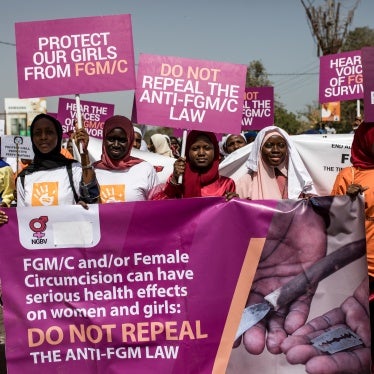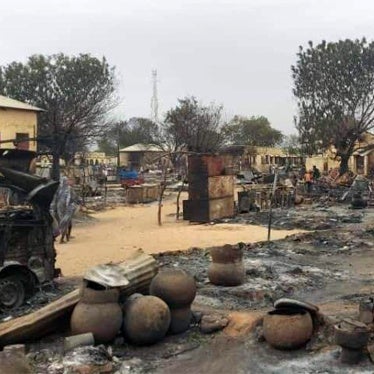Chairman McGovern, Chairman Pitts, members of the committee: Thank you for organizing this hearing to discuss the human rights situation in Darfur.
I was asked to speak about allegations of mass rape by Sudanese forces in the town of Tabit in North Darfur late last year. I will keep my comments brief and ask that the recent Human Right Watch report “Mass Rape in Darfur: Sudanese Army Attacks Against Civilians in Tabit” be submitted for the record.
After more than 12 years of conflict in Darfur, the human rights situation remains dire. The UN Panel of Experts on Darfur reported that government forces and militias attacked and destroyed 3,324 villages between December 2013 and April 2014. Hundreds of thousands of civilian were displaced by this violence. Widespread attacks against civilians have continued through the first two months of 2015.
Gathering precise information on the human rights abuses that occurred during these and other attacks against civilians in Darfur by all sides has been extraordinarily difficult. The government of Sudan has systematically denied access to Darfur to all international human rights organizations and independent journalists. It has also consistently prevented human rights investigators from the African Union-United Nations Mission in Darfur, UNAMID, from carrying out on-site investigations of attacks and human rights abuses across Darfur.
Because of these government obstructions, Human Rights Watch has had to rely on remote research methods to investigate events in Darfur. This includes telephone interviews with victims and other witnesses in Darfur and in-person interviews with those who fled to neighboring countries. People still in Sudan who chose to speak with us have done so at great risk to their own safety.
In October and November 2014 I traveled with a colleague to eastern Chad and visited several towns, refugee camps, and informal refugee sites along the border with Sudan. We interviewed dozens of men and women who had recently fled attacks from government forces, primarily in North Darfur.
Many of the victims and other witnesses we interviewed reported that their villages had been attacked by the Rapid Support Forces, or RSF, which is a newly formed paramilitary force under the direct command of Sudan’s National Intelligence and Security Services. They said that these forces carried out killings and other abuses, and looted and burned villages, forcing their families to flee. Several women told me that they had made perilous journeys through the desert without food or water.
We also heard many accounts of rape committed by government soldiers. A 20-year-old woman told me that during a government attack she escaped by climbing a tree with her one-year-old baby tied to her back and watched soldiers rape and kill six women from her village. Dozens of other refugees relayed similarly awful stories.
In early November, while we were conducting these interviews in Chad, Radio Dabanga, a Netherlands-based radio station that reports news on Darfur, reported that more than 200 women had been raped by members of the Sudanese military in the North Darfur town of Tabit. In the following days, the station and local Sudanese media outlets continued reporting on the incident. The government reportedly had cut off all access to the town. Even UNAMID, which has two large bases within 34 miles of Tabit, was unable to gain access.
Given the lack of access to Tabit, I decided to try to speak with residents of the town by phone with the assistance of a Sudanese colleague. Witnesses to the incident were difficult to locate and extraordinarily fearful of speaking. However, over the course of two months, we were ultimately able to interview over 50 current and former residents of Tabit.
Through accounts from these victims and witnesses we were able to determine that over the course of 36 hours beginning on October 30, 2014, Sudanese army troops carried out a series of attacks against the civilian population in Tabit. No rebel forces were reported in the town. The attacks included the mass rape of women and girls and the arbitrary detention, beating and ill-treatment of scores of people. Sudanese government forces carried out the rapes and other abuses during three distinct military attacks against the town: the first beginning the evening of Thursday, October 30; the second on the morning of Friday, October 31; and the third starting that evening and continuing until the following morning.
Witnesses told me that during each of these attacks, government soldiers went house-to-house in Tabit, searching homes on the pretense of looking for a missing soldier, looting property, severely beating residents, and raping women and girls. On the two nights, soldiers forced many of the men to outdoor locations on the outskirts of the town, leaving the women and children especially vulnerable. The soldiers detained the men en masse, and threatened and physically abused them throughout the night.
Residents recognized some of the soldiers as among those stationed at the Sudanese Armed Forces base on the outskirts of Tabit. Two soldiers, who participated in the attacks but later defected to a rebel group, said that other soldiers had come from bases in El-Fasher, the North Darfur capital northeast of Tabit. These two soldiers said that superior officers had ordered them to “rape women” because the women were rebel supporters.
One mother, in her early forties, told me that soldiers came into her house and raped her and her three daughters, two of whom were under the age of 11. She said:
Immediately after they entered the room they said: “You killed our man. We are going to show you true hell.” They started beating us. They took my husband away while beating him. They raped my three daughters and me. Some of them were holding the girl down while another one was raping her. They did it one by one.
In total we interviewed 15 survivors of rape. These survivors together with eyewitnesses provided firsthand information of 27 incidents of rape. They, along with 23 other credible sources, gave information about an additional 194 incidents of rape. Altogether, we collected the names and other information on 221 women and girls who were allegedly raped.
Those who carried out and ordered rape and other abuses were responsible for war crimes. Based on the testimony and other evidence, Human Rights Watch determined that the mass rape in Tabit was part of a widespread and systematic attack on a civilian population, and may amount to crimes against humanity.
The complete list of women and girls who were raped or subjected to sexual violence by Sudanese military personnel in Tabit will not be known until independent and impartial investigators with expertise in sexual and gender-based crimes are granted unfettered access to Tabit and town residents feel safe to share their experiences without fear of retaliation.
Since the attacks, Sudanese government officials, military commanders, and traditional leaders responsible for Tabit have taken drastic measures to prevent information about the rapes and other abuses from becoming public. They have threatened, intimidated, beaten, detained, and tortured residents of Tabit to prevent them from speaking out about what took place.
And they have not allowed any investigators to access the town. The government did allow UNAMID peacekeepers one short visit, accompanied by government security officials. However, we believe this investigation was not credible; victims and witnesses told us they were instructed by local authorities not to speak about the crimes. After this visit, authorities denied all subsequent requests by UNAMID and other investigators. To this day, the victims of Tabit are still living in fear of further attacks; many of the perpetrators of remain based immediately outside the town.
Human Rights Watch urges the US government and other members of the UN Security Council to take concrete steps to help protect civilians in Darfur from further abuse, ensure access to medical care for victims, and see those responsible for the crimes are brought to justice. UNAMID should be supported to establish a permanent presence in Tabit, such as an operating base, and carry out proactive patrols in and around the town to protect civilians.
Chairman McGovern and Chairman Pitts, my sincere thanks once again for giving me the opportunity to address this commission and to relay accounts of the victims of the horrific attack on Tabit. I am happy to answer any questions that you have.







